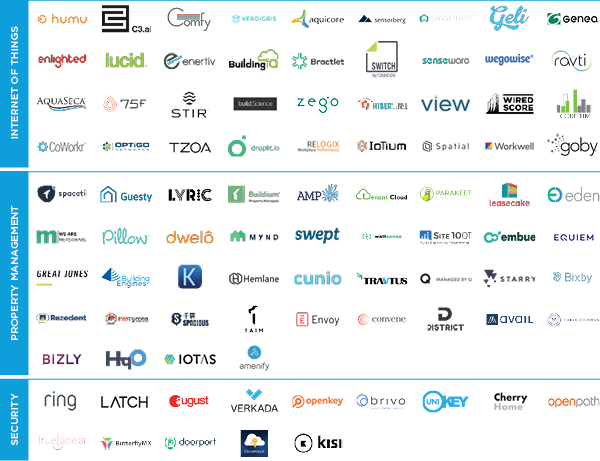When it comes to smart buildings, companies have transitioned from the basics of efficient energy utilization to generating higher alpha by asset optimization and improving productivity using several building automation tools. Not only do smart buildings provide cost-savings, but they also offer a healthier and more productive environment, and tenants are willing to pay premium prices for these advanced features and services. In fact, Orbisresearch.com expects the Smart Building Market to grow from $8.49 billion in 2016 and to $57.81 billion at the end of 2023.
In order to increase the overall return on investment for commercial real estate, today’s venture companies are concentrating on one of the three pillars of smart buildings: Internet of Things (IoT), Security and Property Management/Amenities improvement tools. Each of these pillars generates a unique ability to maximize return, and we believe are likely to play a critical role in the years to come.
Internet of Things: The advent of the Internet of Things (IoT) has revolutionized the industry, by delivering more accurate and useful information for improving operations and providing the best experiences for tenants, but we believe it is still the tip of the iceberg. With the cost of connected sensors and devices going down, IoT provides an opportunity for unprecedented insights into building data, which was traditionally impossible to track.
Security: Only a few years ago, isolated Building Management Systems (BMS) used to exclusively control functions such as heating and air conditioning, the lift or lighting systems but the growth of smart building calls for increased security for tenant data, people and the contents of the building. In addition to increased collaboration and communication between stakeholders, we believe going forward the industry will need a robust integration of conventional technologies with latest IoT services and cloud services to provide adequate security in this new era of real estate.
Property Management: Property owners and occupiers require high-level of maintenance and care of their facilities – making property management the lynchpin of building operations. That said, technology still remains underused in this space and has the potential to drastically reduce expenses while improving the quality of service. Automation could result in less time and money spent on overseeing repairs, communicating with tenants, and collecting payments – all while providing tenants with a better building experience.
Our research shows a significant rise in the number of businesses focused on these disciplines including the following notable start-ups that are developing technology to build smarter and more efficient buildings.

With the rise in connected spaces, it’s obvious that smart buildings will become the gold standard of commercial real estate in the not so distant future. Smart technologies enable us to spend less effort on mundane tasks and more time driving innovative solutions that improve our lives. As we look to the future of smart technologies, we believe that we will continue to see specialized solutions in IoT, security, and property management but the next logical step is to create centralized systems that integrated these technologies for seamless management. This next big wave in smart buildings will not only further reduce internal inefficiencies for businesses but ultimately led to better, more profitable relationships with tenants.
Disclaimer: While we use reasonable efforts to include accurate and up-to-date information, we do not represent, warrant, or promise (whether expressly or by implication) that any Content (including any information sourced from third parties or estimates calculated by us) is or remains available, accurate, complete and up-to-date, free from bugs, errors or omissions or fit or suitable for any purpose. R-LABS Canada Inc., its shareholders, directors, officers, employees, representatives, and agents will not be liable to you or any third party for any indirect, special, incidental, punitive, exemplary, or consequential damages in connection with the use of this information.




